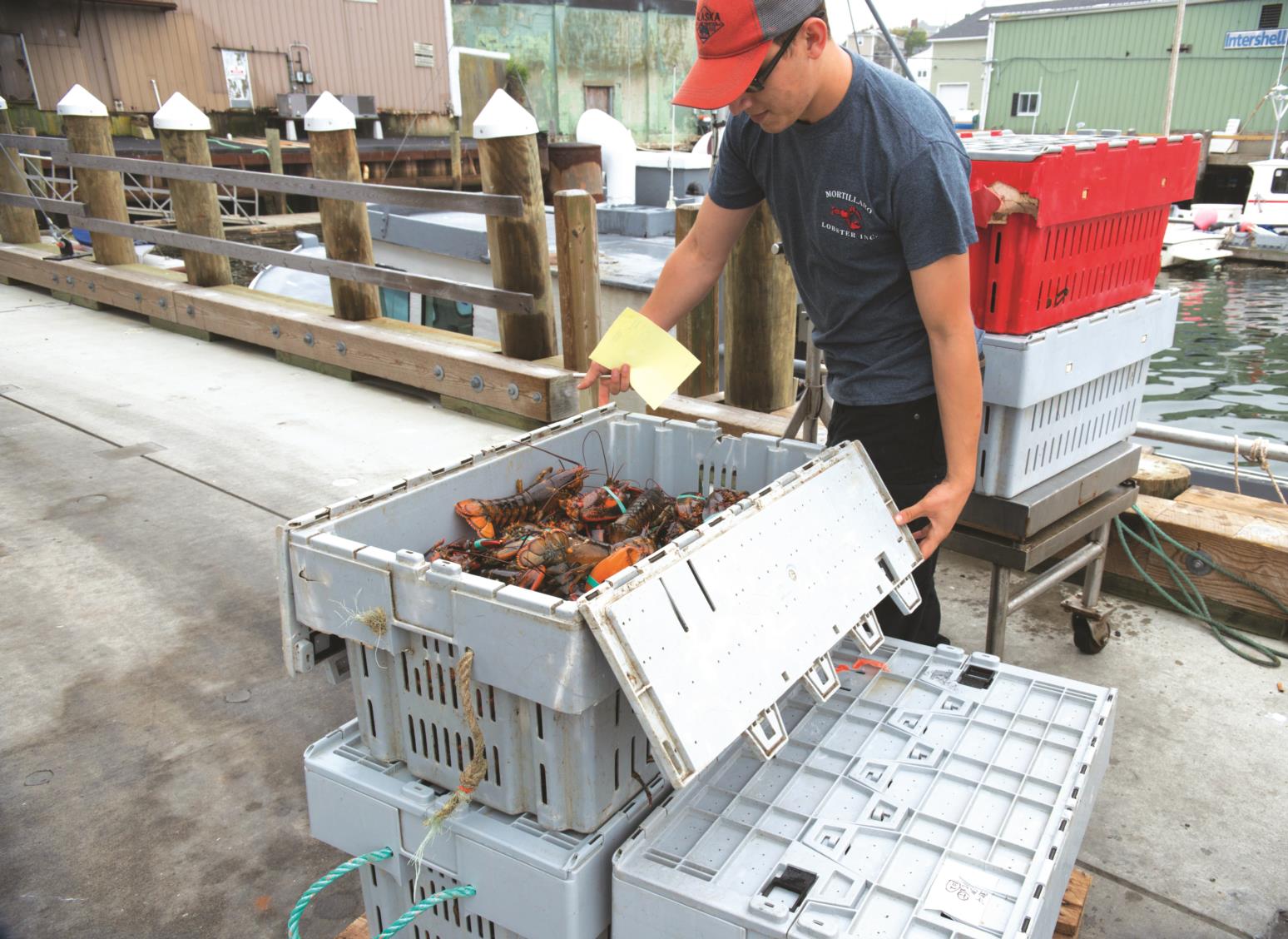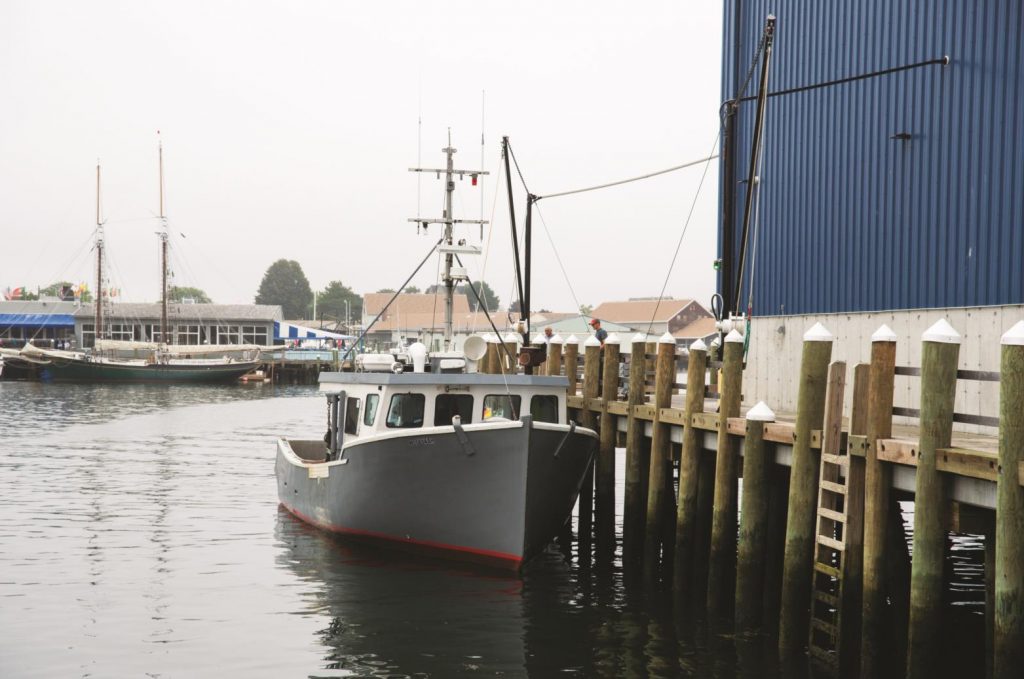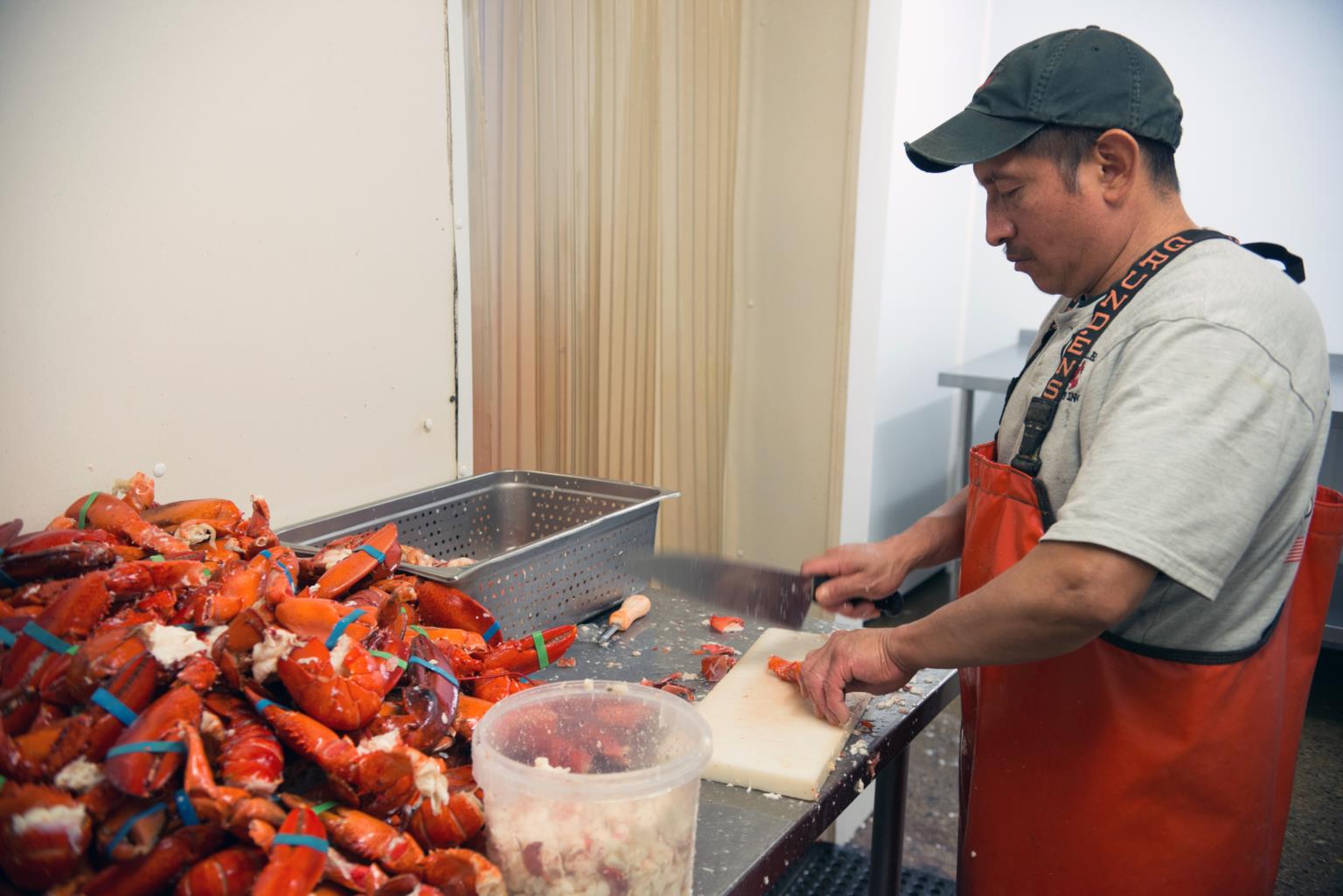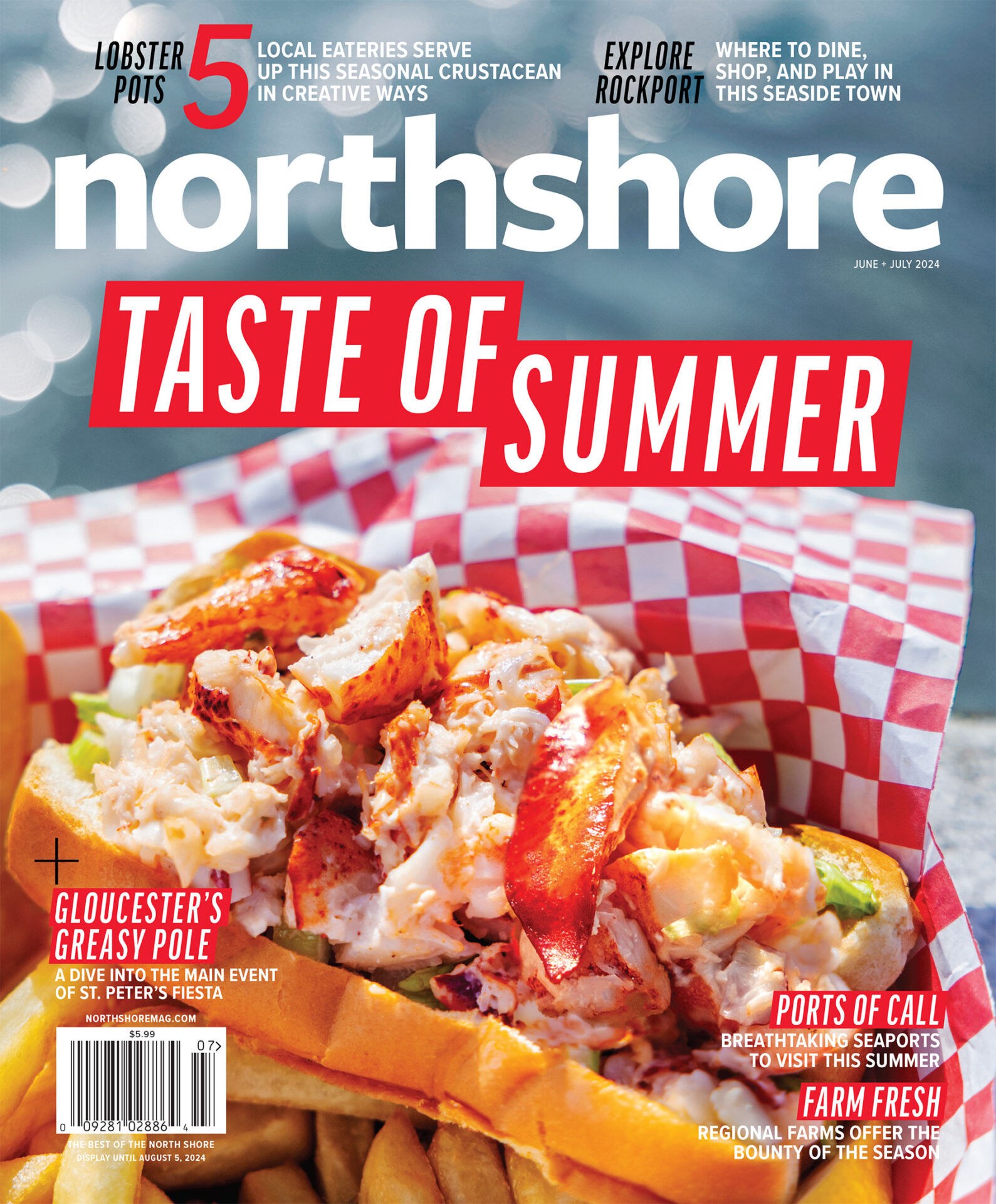 “If there wasn’t any salt in it,” adds Gino, “you could drink the water.”
There’d be plenty to drink, too. Mortillaro’s three tanks hold a combined 175,00 gallons of ocean water and 95,000 pounds of lobster. The newest is an 80,000-gallon bath housed in a multimillion-dollar pier house expansion. The facility features high-tech chiller barrels that maintain an ideal water temperature of 38-40 degrees Fahrenheit, making it a frigid spa that protects the sweet meat that makes North Shore lobsters a global delicacy. And global is exactly what Mortillaro Lobster has become.
For more than 50 years, the Mortillaros have been part of Gloucester’s pantheon of fishing families. Michael Mortillaro came to Cape Ann from Sicily in 1960, finding work as a boat carpenter. As boatbuilding shifted away from wooden hulls, he adapted. He and his sons, Vince and Gino, built thousands of tuna coffins—massive wooden crates used to ship Gloucester’s prized bluefins to far-off destinations.
When tuna hauls dwindled, the Mortillaros became a wholesaler of fish and lobster. And in the 1990s, when fishing regulations tightened, they became an exclusive purveyor of New England’s favorite crustacean.
“If there wasn’t any salt in it,” adds Gino, “you could drink the water.”
There’d be plenty to drink, too. Mortillaro’s three tanks hold a combined 175,00 gallons of ocean water and 95,000 pounds of lobster. The newest is an 80,000-gallon bath housed in a multimillion-dollar pier house expansion. The facility features high-tech chiller barrels that maintain an ideal water temperature of 38-40 degrees Fahrenheit, making it a frigid spa that protects the sweet meat that makes North Shore lobsters a global delicacy. And global is exactly what Mortillaro Lobster has become.
For more than 50 years, the Mortillaros have been part of Gloucester’s pantheon of fishing families. Michael Mortillaro came to Cape Ann from Sicily in 1960, finding work as a boat carpenter. As boatbuilding shifted away from wooden hulls, he adapted. He and his sons, Vince and Gino, built thousands of tuna coffins—massive wooden crates used to ship Gloucester’s prized bluefins to far-off destinations.
When tuna hauls dwindled, the Mortillaros became a wholesaler of fish and lobster. And in the 1990s, when fishing regulations tightened, they became an exclusive purveyor of New England’s favorite crustacean.
 Today, the family business is booming. Vince, Gino, and three of Gino’s four sons work at the company’s seaside operation. (The eldest, now an accountant, also put in his time at the wharf.) Every year, the company ships 5.5 million pounds of lobster to customers from Cape Ann to California, New York to Shanghai. The shellfish come from a stretch of ocean that runs from Canada through the Gulf of Maine to the North Shore. Locally, the wholesaler buys 30 percent of the lobsters landed in Gloucester, making them a major player in the Cape Ann economy.
“We’re the only company in town investing in the marine industrial area of the harbor,” says Vince.
For locals who call ahead, Vince and Gino are happy to sell lobsters directly from their tanks. And the company sells steamed lobster meat to local restaurants, including Latitude 43 in Gloucester and the famous Woodman’s of Essex.
“It’s the freshest lobster you’re gonna get,” says Brett Herlihy, head chef at Latitude 43.
Located across the harbor from Mortillaro Lobster, Latitude 43 has been ordering from the wholesaler for almost 10 years. In the busy season, the restaurant buys 50-80 pounds of steamed lobster meat every week—meat that is cooked, shucked, and delivered the same day it’s ordered. That means Herlihy can boast some of the freshest lobster dishes around, from a gourmet lobster mac and cheese with smoked gouda and bacon to a spicy lobster sushi roll.
At Woodman’s of Essex, a Cape Ann institution for 103 years, it’s the lobster rolls that benefit from Mortillaro’s pampered crustaceans. Steve Woodman orders up to 150 pounds of steamed meat each week to satisfy customers’ demand for sweet lobster chunks scooped onto a grilled and buttered roll. The third-generation restaurant owner says good lobster can be difficult to find year-round, and he refuses to use frozen meat.
Today, the family business is booming. Vince, Gino, and three of Gino’s four sons work at the company’s seaside operation. (The eldest, now an accountant, also put in his time at the wharf.) Every year, the company ships 5.5 million pounds of lobster to customers from Cape Ann to California, New York to Shanghai. The shellfish come from a stretch of ocean that runs from Canada through the Gulf of Maine to the North Shore. Locally, the wholesaler buys 30 percent of the lobsters landed in Gloucester, making them a major player in the Cape Ann economy.
“We’re the only company in town investing in the marine industrial area of the harbor,” says Vince.
For locals who call ahead, Vince and Gino are happy to sell lobsters directly from their tanks. And the company sells steamed lobster meat to local restaurants, including Latitude 43 in Gloucester and the famous Woodman’s of Essex.
“It’s the freshest lobster you’re gonna get,” says Brett Herlihy, head chef at Latitude 43.
Located across the harbor from Mortillaro Lobster, Latitude 43 has been ordering from the wholesaler for almost 10 years. In the busy season, the restaurant buys 50-80 pounds of steamed lobster meat every week—meat that is cooked, shucked, and delivered the same day it’s ordered. That means Herlihy can boast some of the freshest lobster dishes around, from a gourmet lobster mac and cheese with smoked gouda and bacon to a spicy lobster sushi roll.
At Woodman’s of Essex, a Cape Ann institution for 103 years, it’s the lobster rolls that benefit from Mortillaro’s pampered crustaceans. Steve Woodman orders up to 150 pounds of steamed meat each week to satisfy customers’ demand for sweet lobster chunks scooped onto a grilled and buttered roll. The third-generation restaurant owner says good lobster can be difficult to find year-round, and he refuses to use frozen meat.
 “They’ve got a great filtration system and tanks, and they always have a steady supply of fresh lobsters,” says Woodman. “It’s always great when you can buy locally and help the local economy.”
While lobstering is not subject to the same regulatory challenges as the local fishing industry, Mortillaro Lobster faces a common threat in the form of global warming and pollution. Patti Page spent 32 years with the National Oceanic and Atmospheric Administration, and she’s now Mortillaro’s industry representative. She says the local lobster industry is well managed and sustainable—record catches are happening across northern New England—but rising ocean temperatures are “shifting the whole fishery north.”
In New York and Connecticut, where lobstering was once a viable industry, Page points to a mosquito insecticide that contributed to the industry’s demise. The Mortillaros, she says, are keenly aware of the risks to all businesses that profit from the sea. “They understand that environmental stewardship is of the utmost importance,” says Page.And they’re taking action. In 2014, the company looked to reduce local water pollution by partnering with a University of Massachusetts Boston professor to create a floating island just offshore. Made of recycled materials, the structure would have been seeded with bivalves to naturally filter Gloucester Harbor’s water. Funding for the project fell through, but when it came time to build Mortillaro Lobster’s new pier house, the wholesaler chose a design that can withstand rising sea levels and storm surge.
It’s an adaptive approach that dates back to Michael Mortillaro’s days as an immigrant boatbuilder on Cape Ann, adjusting to the constantly changing tides.
“We work seven days a week and have a good business,” says Vince. “My father would be psyched.”
978-282-4621
“They’ve got a great filtration system and tanks, and they always have a steady supply of fresh lobsters,” says Woodman. “It’s always great when you can buy locally and help the local economy.”
While lobstering is not subject to the same regulatory challenges as the local fishing industry, Mortillaro Lobster faces a common threat in the form of global warming and pollution. Patti Page spent 32 years with the National Oceanic and Atmospheric Administration, and she’s now Mortillaro’s industry representative. She says the local lobster industry is well managed and sustainable—record catches are happening across northern New England—but rising ocean temperatures are “shifting the whole fishery north.”
In New York and Connecticut, where lobstering was once a viable industry, Page points to a mosquito insecticide that contributed to the industry’s demise. The Mortillaros, she says, are keenly aware of the risks to all businesses that profit from the sea. “They understand that environmental stewardship is of the utmost importance,” says Page.And they’re taking action. In 2014, the company looked to reduce local water pollution by partnering with a University of Massachusetts Boston professor to create a floating island just offshore. Made of recycled materials, the structure would have been seeded with bivalves to naturally filter Gloucester Harbor’s water. Funding for the project fell through, but when it came time to build Mortillaro Lobster’s new pier house, the wholesaler chose a design that can withstand rising sea levels and storm surge.
It’s an adaptive approach that dates back to Michael Mortillaro’s days as an immigrant boatbuilder on Cape Ann, adjusting to the constantly changing tides.
“We work seven days a week and have a good business,” says Vince. “My father would be psyched.”
978-282-4621
